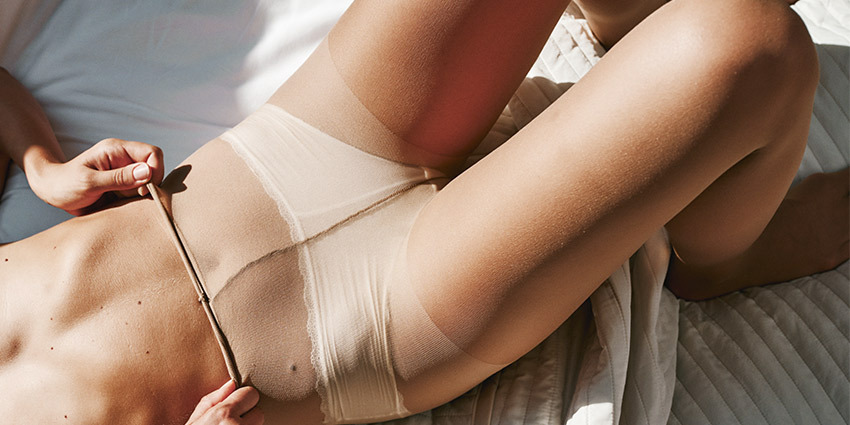It has become a norm in our day and age to shave your pubic hair. Most people consider pubic hair removal to be one of their regular beauty rituals, but the pandemic had changed things quite a bit when many places were closed, and people had to turn to other ways of removing unwanted hair.

When dresses and tailored suits were exchanged for sweats and leggings, it’s only natural that some people completely forgo shaving down there, letting it run wild.
If you’ve found yourself in this situation during the pandemic, now that the world is slowly coming back to the regular regime, you might be wondering should you shave your pubic hair and go back to your old ways? Or should you embrace your body as it is and learn to enjoy the full bush?
The Purpose of Pubic Hair
The hair in your pubic region has a purpose, in fact, quite a few. First, pubic hair offers a layer of protection because the skin in your pubic area is very sensitive.
Another purpose your pubic hair serves is to protect your genitals from bacteria. Like hair inside your nose or eyelashes, pubic hair traps dirt and potentially harmful bacteria from coming inside your body.
While pubic hair does protect the skin from bacteria, it doesn’t mean that it will protect from STIs, so you should always opt for using condoms to protect yourself during sex.
Pubic hair also serves as nature’s signal of sexual maturity and one’s ability to reproduce as it starts growing on people’s bodies around the time when the reproductive system becomes mature enough. While in the 21st century, it’s not an indication or a sign for a person to start being sexually active, it used to be in the past.
As you can see, pubic hair does serve a purpose other than annoying people and making them suffer through a waxing session. When you’re considering whether you should shave your pubic hair or not, it might be useful to remember that it’s there for a reason.
Evolution of Pubic Hair Throughout History
The way people treated their pubic hair varied throughout history widely. While overall hair removal was normal as early as the Stone Age, when humans opted to remove the hair from their bodies for safety reasons and to avoid frostbite in harsh climates, pubic hair removal became a norm in Ancient Egypt.
During that era, body hair, pubic hair included, was considered uncivilized, dirty, and unhygienic. Women removed the hair from their bodies and even their heads with seashells and pumice stones. During Cleopatra’s ruling period, people started using “sugaring” as a form of hair removal, which used sugar, water, and lemon juice paste to remove the hair the same way nowadays people use wax.
In Ancient Rome, upper-class women also removed their hair, and most of the statues from those times portray hairless bodies of men and women in the art.
Later, during the Middle Ages in Europe, the trend for women to shave their eyebrows and hair was prominent amongst the upper class. But during that period, pubic hair stayed untouched, and according to the Catholic church, a full bush was a display of femininity.
In America, the trend of shaving pubic hair for women arrived fairly late, in the 1900s when Gillet created their first razor for women and started running ads in the magazines. The trends of pubic hair tending changed with each decade, though.
In the ’60s and ’70s, it was normal to grow all the hair out, but by the time the ’80s rolled around, and the bikini’s started making way into women’s wardrobes, the full Brazilian bikini wax was considered the only way to go if a woman wanted to be sexually attractive.
While the trends haven’t changed as drastically in the last few decades, overall, it’s still considered more attractive for people to have their pubic area shaved clean. In fact, a large percentage of women and men both trim and shave their pubic hair specifically for having sex with a partner.
However, nowadays, it’s more socially acceptable to treat pubic hair removal as a personal choice, and media seem to reflect the idea that everything is acceptable no matter which way you swing.
So, Should You Shave Your Pubic Hair?
Knowing the purpose of pubic hair and the history of how the trends around it changed, the question of whether you should shave your pubic hair remains.
There are pros and cons to both:
Why You Would Want to Shave Your Pubic Hair
It Will Increase Your Sensitivity
No hair means more friction, so you might feel more sensitive during sex which can have its benefits. However, it’s not a guarantee, and really the only way to find out whether full Brazilian wax makes sexy time feel smoother is to give it a spin and see how it feels yourself.
Also, your pubic hair creates a soft cushion between you and your underwear, which removes the friction, and if you decide to shave, you might experience some stimulation even if you’re just going on about your day.
You Might Engage in More Oral Sex
Studies have found amongst both men and women that those who shave their pubic area are more prone to engage in oral sex than those who don’t.
Whether you or your partner have pubic hair or not shouldn’t really be an obstacle to enjoying all sorts of different sexual experiences, oral sex included. But if you’re struggling with relaxing or enjoying oral sex because of your pubic hair, it might be worth experimenting with and see if it can help ease the stress that comes with receiving oral sex.
Naughty Self-Expression
There is such thing as pubic hair styling, and there are many different hairstyles you can have in your bikini area. From triangles to landing strips and butterflies, a waxing professional can create a whole array of different forms.
It would potentially be a fun way to spice things up in the bedroom as you surprise your partner with different forms and shapes each month. And if you’re not willing to experiment with your hair on the head, it might be worth playing with your pubic hair instead.
More Positive Body Image
Studies show that both women and men tend to view themselves and their genitals better when they’re shaven. It can make you feel sexier and desirable, and if it helps improve your relationship with your body, then it might be worth experimenting with shaving your pubic hair.
Why You Might Want to Embrace the Full Bush
Full Bush Will Turn You On
The first reason why you should consider not shaving your pubic hair is pheromones.
While a lot of people consider a clean shave in the bikini area a turn-on, biologically, a full bush might actually have a more arousing reaction to your partner than you think.
The sweat glands that hair-bearing skin has exude an odorless secretion which, mixed with the bacteria on our skin, creates a scent called pheromone. Compared with other body zones, the pubic area has more of these sweat glands, and the pubic hair is going to carry the scent that will do things to your partner.
It’s Completely Safe and Hygienic
One of the main reasons why women, particularly, ponder whether they should shave their pubic hair or not is the myth of full bush being unhygienic. In one 2016 study, women claimed that removing pubic hair made them feel cleaner.
Despite this common stigma, pubic hair is actually completely hygienic, as long as you maintain your regular body hygiene routine, so it’s completely safe and clean and shouldn’t be a reason why you wouldn’t embrace the full bush.
No More Itching and In-Grown Hairs
One of the most notable downsides of pubic hair removal is the itching and unwanted in-grown hairs that come with the territory and are difficult to avoid. Your skill will most likely need more care, like exfoliating and moisturizing, so you have to consider whether it’s worth your time.
If You Choose to Remove Pubic Hair, Do This
There are many different ways to remove pubic hair, and the best method will depend on each person individually. But if you’re looking for professional advice, then Dr. Simi Adedeji suggests opting for one of the two pubic hair removal options:
- Laser hair removal
- Depilation creams
According to Dr. Simi Adedeji, these two methods are the best because depilation creams weaken the hair, and when it grows back, it doesn’t have the sharp edge to grow into your skin, causing inflammation. And with laser hair removal, the hair follicle is destroyed, preventing it from growing back completely.
